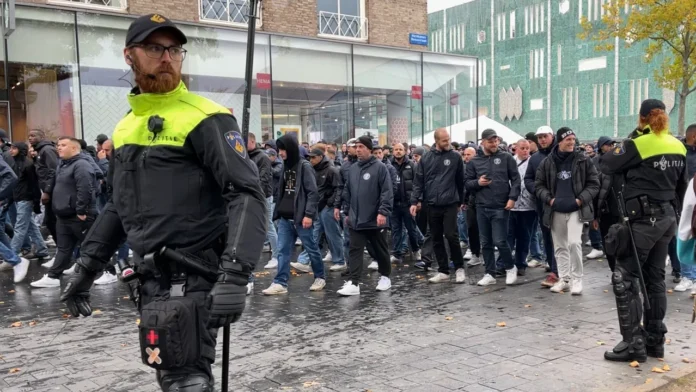East Brabant police are concerned about developments around football violence in the region. Police chief Wilbert Paulissen believes too many police officers now have to be deployed around football matches.
In the 73 home matches that have taken place in East Brabant since April, the police have had to turn out 19 times, Paulissen says. ” Nine times of those we had to scale up ad hoc – at the last minute without being taken into account beforehand. That demands a lot from our capacities. And we have seen since corona that violence or disorder is becoming more and more violent.”
This does not only play out in the Eredivisie, first division matches also require more and more frequent, increasing police deployment. “Normally no major deployment is needed around matches of, for example, Helmond Sport, but now we have had to scale up unexpectedly a few times. At FC Eindhoven’s promotion game against ADO Den Haag, at the end of last season, I held my heart. After all, that stadium is not ready to receive crowds of supporters from the Eredivisie.”
European
International matches also require more and more police deployment. “Then, moreover, we are also busy the day before the match to keep things on track,” Paulissen says. “At European matches of PSV already 200 to 300 men have to be deployed.”
One reason for the increased unrest around football matches lies with a new, young generation of football supporters, the police chief believes. “We count around five to six generations at PSV. What you used to see is that the older generations are becoming a bit calmer and a bit more inhibitory towards younger generations. You now see that generation increasingly diverging. Younger generations start out as mood groups, but they are increasingly involved in public disorder and violence. You also see them less and less dressing up as club supporters, but rather all in black, with hoods – they look more like burglars, a strange image.”
Anti-government sentiment
The corona crisis is leaving its mark in this respect, Paulissen believes. “Our people notice from the ground up that they don’t get in touch with that younger group as easily. They are also much more sensitive to restrictive measures. You see after corona that antigovernmental sentiment has increased among those groups. They also call themselves the ‘ultra’s’. They do a lot for the atmosphere, and we like that too, if there is a good atmosphere around a match, but it also increasingly translates to public disorder.”
“In that respect, we experienced it in the superlative at the match against FC Zurich. That group had almost worn a kind of uniform, all wearing the same blue jackets. They came off the bus and you immediately sensed, ‘this is going wrong’.
Complex
The matches mean that more and more police deployment is needed, while at the same time the police are facing staff shortages. People deployed around matches cannot be present in neighbourhoods. This worries Paulissen.
“We also had the situation this year that at the extension of a match we could not put a group of away supporters on the train – because it would no longer run. There was no extension so we were lucky with that, but it does indicate the increasing complexity around the organisation of football matches.”
Commercial interests
So shouldn’t mayors intervene earlier, and schedule matches at other times? According to Paulissen, it is not that simple. “In principle, when it comes to football matches, a mayor does indeed decide how they are scheduled. But they only have the power to cancel events, not to reschedule them, although you might have to do something about that with licensing.”
So what can be done to enable less police deployment around matches? Paulissen is thinking of combi regulations, scheduling matches earlier so supporters don’t have a few more hours to drink in the city, and a more person-centred approach around individuals causing unrest.
“It’s not easy. There are so many commercial interests around matches, with broadcasting rights and things like that. Mayors have to take that into account as well. Issues around international travel – for European matches – also play a role. That makes it very complicated. But the solution around football violence cannot just be ‘more police deployment’, we have to look for other solutions,” Paulissen said.
Source: www.studio040.nl
Translated by: Simge Taşdemir
















